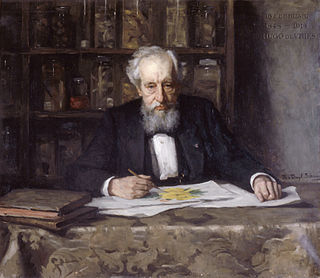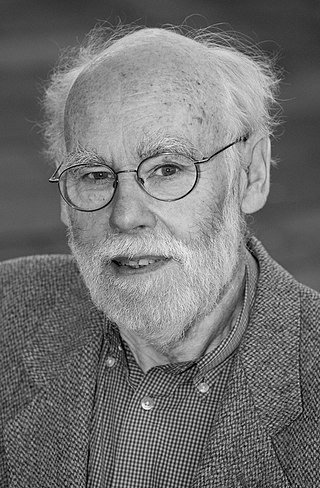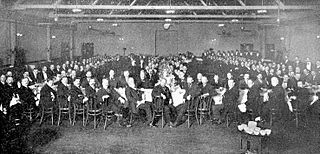Related Research Articles
Genetic drift, also known as random genetic drift, allelic drift or the Wright effect, is the change in the frequency of an existing gene variant (allele) in a population due to random chance.
The American Naturalist is the monthly peer-reviewed scientific journal of the American Society of Naturalists, whose purpose is "to advance and to diffuse knowledge of organic evolution and other broad biological principles so as to enhance the conceptual unification of the biological sciences." It was established in 1867 and is published by the University of Chicago Press. The journal covers research in ecology, evolutionary biology, population, and integrative biology. As of 2018, the editor-in-chief is Daniel I. Bolnick. According to the Journal Citation Reports, the journal had a 2020 impact factor of 3.926.
Population genetics is a subfield of genetics that deals with genetic differences within and among populations, and is a part of evolutionary biology. Studies in this branch of biology examine such phenomena as adaptation, speciation, and population structure.

Evolutionary biology is the subfield of biology that studies the evolutionary processes such as natural selection, common descent, and speciation that produced the diversity of life on Earth. In the 1930s, the discipline of evolutionary biology emerged through what Julian Huxley called the modern synthesis of understanding, from previously unrelated fields of biological research, such as genetics and ecology, systematics, and paleontology.

Genetics and the Origin of Species is a 1937 book by the Ukrainian-American evolutionary biologist Theodosius Dobzhansky. It is regarded as one of the most important works of modern synthesis and was one of the earliest. The book popularized the work of population genetics to other biologists and influenced their appreciation for the genetic basis of evolution. In his book, Dobzhansky applied the theoretical work of Sewall Wright (1889–1988) to the study of natural populations, allowing him to address evolutionary problems in a novel way during his time. Dobzhansky implements theories of mutation, natural selection, and speciation throughout his book to explain the habits of populations and the resulting effects on their genetic behavior. The book explains evolution in depth as a process over time that accounts for the diversity of all life on Earth. The study of evolution was present, but greatly neglected at the time. Dobzhansky illustrates that evolution regarding the origin and nature of species during this time in history was deemed mysterious, but had expanding potential for progress to be made in its field.

Sewall Green Wright FRS (For) ForHonorary FRSE was an American geneticist known for his influential work on evolutionary theory and also for his work on path analysis. He was a founder of population genetics alongside Ronald Fisher and J. B. S. Haldane, which was a major step in the development of the modern synthesis combining genetics with evolution. He discovered the inbreeding coefficient and methods of computing it in pedigree animals. He extended this work to populations, computing the amount of inbreeding between members of populations as a result of random genetic drift, and along with Fisher he pioneered methods for computing the distribution of gene frequencies among populations as a result of the interaction of natural selection, mutation, migration and genetic drift. Wright also made major contributions to mammalian and biochemical genetics.

Mutationism is one of several alternatives to evolution by natural selection that have existed both before and after the publication of Charles Darwin's 1859 book On the Origin of Species. In the theory, mutation was the source of novelty, creating new forms and new species, potentially instantaneously, in sudden jumps. This was envisaged as driving evolution, which was thought to be limited by the supply of mutations.

Douglas Joel Futuyma is an American evolutionary biologist. He is a Distinguished Professor in the Department of Ecology and Evolution at Stony Brook University in Stony Brook, New York and a Research Associate on staff at the American Museum of Natural History in New York City. His research focuses on speciation and population biology. Futuyma is the author of a widely used undergraduate textbook on evolution and is also known for his work in public outreach, particularly in advocating against creationism.

Brian Charlesworth is a British evolutionary biologist at the University of Edinburgh, and editor of Biology Letters. Since 1997, he has been Royal Society Research Professor at the Institute of Evolutionary Biology (IEB) in Edinburgh. He has been married since 1967 to the British evolutionary biologist Deborah Charlesworth.

The American Society of Naturalists was founded in 1883 and is one of the oldest professional societies dedicated to the biological sciences in North America. The purpose of the Society is "to advance and diffuse knowledge of organic evolution and other broad biological principles so as to enhance the conceptual unification of the biological sciences."

Robert Eric Ricklefs is an American ornithologist and ecologist. He was the Curators' Professor of Biology at the University of Missouri, St. Louis from 1996 until August 2019.
Mary Jane West-Eberhard is an American theoretical biologist noted for arguing that phenotypic and developmental plasticity played a key role in shaping animal evolution and speciation. She is also an entomologist notable for her work on the behavior and evolution of social wasps.
Russell Scott Lande is an American evolutionary biologist and ecologist, and an International Chair Professor at Centre for Biodiversity Dynamics at the Norwegian University of Science and Technology (NTNU). He is a fellow of the Royal Society and a member of the United States National Academy of Sciences.
Host–parasite coevolution is a special case of coevolution, where a host and a parasite continually adapt to each other. This can create an evolutionary arms race between them. A more benign possibility is of an evolutionary trade-off between transmission and virulence in the parasite, as if it kills its host too quickly, the parasite will not be able to reproduce either. Another theory, the Red Queen hypothesis, proposes that since both host and parasite have to keep on evolving to keep up with each other, and since sexual reproduction continually creates new combinations of genes, parasitism favours sexual reproduction in the host.
Sarah Perin Otto is a theoretical biologist, Canada Research Chair in Theoretical and Experimental Evolution, and is currently a Killam Professor at the University of British Columbia. From 2008-2016, she was the director of the Biodiversity Research Centre at the University of British Columbia. Otto was named a 2011 MacArthur Fellow. In 2015 the American Society of Naturalists gave her the Sewall Wright Award for fundamental contributions to the unification of biology. In 2021, she was awarded the Darwin–Wallace Medal for contributing major advances to the mathematical theory of evolution.
The Extended Evolutionary Synthesis (EES) consists of a set of theoretical concepts argued to be more comprehensive than the earlier modern synthesis of evolutionary biology that took place between 1918 and 1942. The extended evolutionary synthesis was called for in the 1950s by C. H. Waddington, argued for on the basis of punctuated equilibrium by Stephen Jay Gould and Niles Eldredge in the 1980s, and was reconceptualized in 2007 by Massimo Pigliucci and Gerd B. Müller.
Ruth Geyer Shaw is a professor and principal investigator in the Department of Ecology, Evolution and Behavior at the University of Minnesota. She studies the processes involved in genetic variation, specializing in plant population biology and evolutionary quantitative genetics. Her work is particularly relevant in studying the effects of stressors such as climate instability and population fragmentation on evolutionary change in populations. She has developed and applied new statistical methods for her field and is considered a leading population geneticist.

The scientific study of speciation — how species evolve to become new species — began around the time of Charles Darwin in the middle of the 19th century. Many naturalists at the time recognized the relationship between biogeography and the evolution of species. The 20th century saw the growth of the field of speciation, with major contributors such as Ernst Mayr researching and documenting species' geographic patterns and relationships. The field grew in prominence with the modern evolutionary synthesis in the early part of that century. Since then, research on speciation has expanded immensely.
Mark A. Kirkpatrick is a theoretical population geneticist and evolutionary biologist. He currently holds the T. S. Painter Centennial Professorship in Genetics in the Department of Integrative Biology at the University of Texas at Austin. His research touches on a wide variety of topics, including the evolution of sex chromosomes, sexual selection, and speciation. Kirkpatrick is the co-author, along with Douglas J. Futuyma, of a popular undergraduate evolution textbook. He is a member of the United States National Academy of Sciences.
Douglas Schemske is an evolutionary ecologist who made major contributions to research on pollination, the latitudinal gradient in species diversity, the evolution of polyploidy, and plant mating systems.
References
- ↑ "2022 ASN Award for Distinguished Achievement in the Conceptual Unification of the Biological Sciences". Archived from the original on 2022-05-17. Retrieved 2025-01-05.
- ↑ Secretary's Report. 1992. (1992) American Naturalist 140:1058. JSTOR 2462935
- ↑ Wilbur, H. M. (1998). "1996 Sewall Wright Award: Robert T. Paine". The American Naturalist. 151 (1): i–t. Bibcode:1998ANat..151D...1W. doi:10.1086/513833. PMID 18811418.
- ↑ Gill, D. E. (1998). "Sewall Wright Award 1997: Douglas Joel Futuyma". The American Naturalist. 152 (1): i–vi. Bibcode:1998ANat..152D...1G. doi:10.1086/513674. PMID 18811396.
- ↑ Holt, R. D.; McPeek, M. A.; Moran, N. A.; Seger, J. (1999). "1998 Sewall Wright Award: William Donald Hamilton". The American Naturalist. 153 (1): i–ii. Bibcode:1999ANat..153D...1H. doi:10.1086/303156.
- ↑ Jaenike, J. (2000). "1999 Sewall Wright Award: Janis Antonovics". The American Naturalist. 155 (1): i–ii. Bibcode:2000ANat..155D...1J. doi:10.1086/303305.
- ↑ Antonovics, J. (2002). "2001 Sewall Wright Award: Ilkka A. Hanski". The American Naturalist. 159 (1): i. Bibcode:2002ANat..159D...1A. doi:10.1086/338777. PMID 18707395.
- ↑ Huey, R. B. (2003). "Linda Partridge". The American Naturalist. 161 (1): i–ii. Bibcode:2003ANat..161D...1H. doi:10.1086/367716. PMID 12650458.
- ↑ Zuk, M. (2004). "2003 Sewall Wright Award". The American Naturalist. 163 (1): i–ii. Bibcode:2004ANat..163D...1Z. doi:10.1086/381946.
- ↑ McPeek, M. (2005). "2004 Sewall Wright Award". The American Naturalist. 165 (1): i. Bibcode:2005ANat..165D...1M. doi:10.1086/427345.
- ↑ Turelli, M. (2006). "2005 Sewall Wright Award". The American Naturalist. 167 (1): i. Bibcode:2006ANat..167D...1T. doi:10.1086/498280. PMID 17209245.
- ↑ Lande, R (2007). "2006 Sewall Wright Award. Brian Charlesworth". The American Naturalist. 169 (1): iii. doi:10.1086/510731. PMID 17209244.
- ↑ Price, T. (2008). "2007 American Society of Naturalists Awards". The American Naturalist. 171 (1): iii. Bibcode:2008ANat..171D...3P. doi:10.1086/524694.
- ↑ Antonovics, J. (2009). "2008 American Society of Naturalists Awards". The American Naturalist. 173 (1): iv–v. Bibcode:2009ANat..173D...4A. doi:10.1086/593708. PMID 19090703.
- ↑ Ketterson, E. (2010). "2009 American Society of Naturalists Awards". The American Naturalist. 175 (1): ii–iii. Bibcode:2010ANat..175D...2K. doi:10.1086/649134. PMID 19958173.
- ↑ "Sewall Wright Award: Ruth Shaw". American Society of Naturalists. February 24, 2017. Archived from the original on April 5, 2018. Retrieved March 31, 2017.
- ↑ "2022 ASN Award for Distinguished Achievement in the Conceptual Unification of the Biological Sciences". Archived from the original on 2022-05-17. Retrieved 2025-01-05.